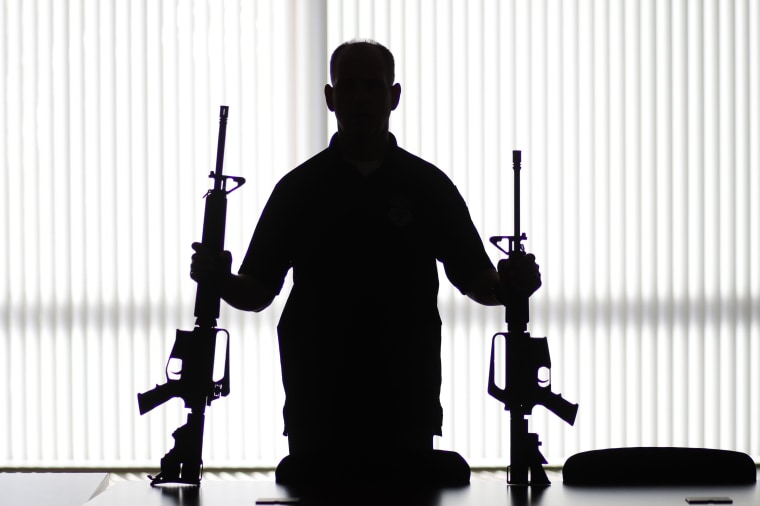In the wake of the nation's latest deadly mass shootings, President Joe Biden, Vice President Kamala Harris, Attorney General Merrick Garland appeared in the Rose Garden earlier today to denounce gun violence as "an epidemic" and "an international embarrassment." Biden also unveiled some policy measures, which were modest but not meaningless.
Biden directed the DOJ to write rules that will reduce the proliferation of "ghost guns," homemade firearms often made from parts bought online and that do not have traceable serial numbers. Biden said he wants kits and parts used to make guns to be treated as firearms where the parts have serial numbers and are subject to a background check.... Finally, he asked the DOJ to publish model "red flag" laws for states to use as guides. Red flag laws allow family members or law enforcement agencies to petition state courts to temporarily block people from obtaining firearms if they present a danger to themselves or others.
The president also, of course, called on Congress to do what he could not: pass new massacre-prevention laws, including a ban on assault weapons, a ban on high-capacity magazines, new background checks, and the removal of liability protections for gun manufacturers.
Is there any reason to believe such measures could pass? Realistically, no. Bills could certainly pass the Democratic-led House -- some already have -- but so long as the Senate filibuster rules remain unchanged, and so long as Senate Republicans refuse to consider popular, common-sense reforms, the proposals are doomed.
But perhaps the most important step the president took today had less to do with a specific policy and more to do with personnel: Biden is nominating David Chipman to lead the Bureau of Alcohol, Tobacco, Firearms and Explosives (ATF). And why is that important? I'm glad you asked.
Chipman is an unusually strong candidate for the job, after having served as an ATF special agent for 25 years. He's also a respected expert on guns and crime, a veteran of the Justice Department, who's recently worked as a senior policy adviser at former Rep. Gabby Giffords' (D-Ariz.) organization -- a group committed to reforming the nation's gun laws.
If Chipman is confirmed, and the odds appear to be in his favor, that would be an unusual development in its own right. Since the position of ATF director became a Senate-confirmed position 15 years ago, a grand total of one person has actually been confirmed to the job: B. Todd Jones, a former federal prosecutor tapped for the job by then-President Barack Obama, just barely passed Senate muster.
But other than Jones, who served nearly two years at ATF, the agency has been led entirely by acting directors. Senate Republicans didn't even confirm Donald Trump's nominee to lead ATF -- and as a rule, GOP senators saw themselves as rubber stamps for whatever Trump wanted.
The trouble, of course, is that Republicans feared Trump's nominee might strictly enforce the nation's gun laws, and the party wasn't prepared to let that happen. Indeed, one of the central reasons the ATF exists is to address gun trafficking and gun crimes, which has led GOP senators for a decade and a half to oppose practically every nominee to lead the agency.
It's why the ATF had no Senate-confirmed director from 2006 to 2013, and again from 2015 through today.
Looking ahead, Republicans won't be able to block David Chipman with a filibuster, so he's likely to get the job. That won't advance pending reforms, but it will strengthen ATF's ability to enforce the policies that already exist.

